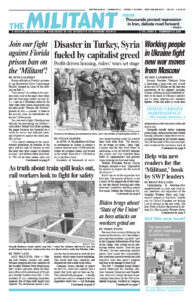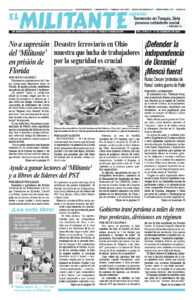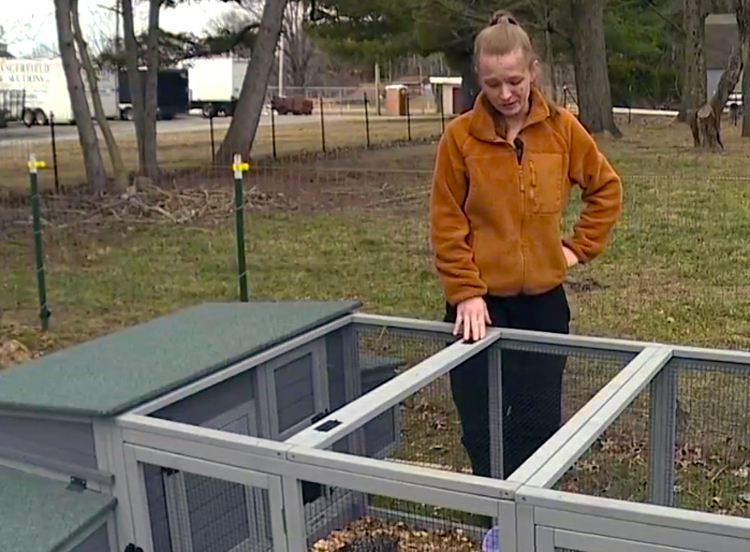EAST PALESTINE, Ohio — Talking with workers, farmers and small-business people in this area, members of the Socialist Workers Party found many have serious questions about the long-term effects of the derailment of 50 cars on a Norfolk Southern train Feb. 3. This included 20 cars containing hazardous material, five of them with liquid vinyl chloride. The derailment caused a massive fire that threatened to reach the five tankers, which came close to exploding. This would send toxic chemicals and shrapnel out over a mile-wide radius.
Company bosses decided to pierce the five cars, drain their contents into a trench they built, and set them on fire. This released both phosgene — a deadly gas that was used as a weapon in the first imperialist world war — and hydrogen chloride, which can affect your throat and lungs. Government authorities enforced a 2-mile mandatory evacuation order.
Now both rail bosses and authorities say it’s safe for people to go home. But many questions remain, both whether it is safe as well as the response of government officials and rail bosses.
All sides of these developments show the importance of the fight being waged by rail workers today for safety, adequate crew size and schedules, and for workers control of rail operations.
Mike Mayer, who lives in the middle of East Palestine, described looking out his window the night of the derailment and seeing the flames reflected in the black clouds overhead. In the morning he checked Sulphur Creek, which runs next to his house, saying it was “pitch black” and the odor was intense. He described how contractors employed by the railroad had put booms across the creek and were pumping some of the surface material off.
Mayer connected the town’s experiences at the hands of the railroad to rail workers’ efforts to win a contract and the subsequent government intervention against them. “How can you force someone to take a contract?” he asked. “They talk about the disruption a strike would have caused, but that’s kind of the point.”
People have reported the deaths of their pets and other animals. Amanda Breshears, who lives in North Lima 10 miles from East Palestine, said the air there smelled and made her eyes water. “My video camera footage shows my chickens were perfectly fine before they started this burn,” she told WKBN-TV, “and as soon as they started the burn, my chickens slowed down and died.”
“They may just be chickens,” she added, “but they’re family.”
Some of the chemicals released got into area creeks and streams. People pointed to pictures of dead fish and frogs.
Dead fish were seen in Leslie Run Creek, which runs down through Negley into the Ohio River. People told us about a sign at Negley saying, “Thank You Norfolk Southern for killing all of our fish.” Further south, West Virginia Gov. James Justice announced the city of Weirton had switched water supply to a different source after chemicals were found in the Ohio River.
The Ohio Department of Natural Resources reported that as of Feb. 8 it knows of 3,500 fish killed by chemicals in area streams so far.
Can’t trust rail bosses, government
Outside of town we met Tub Parker, who has worked for 70 years on the farm that has been in the family for over 100 years. His daughter, Missy Smith, alerted him to the fire from the derailment. He described how “the flames were higher than the trees on the top of the hill behind my house.”
Smith, who has a candle-making business in town, said, “We need independent testing of the water and air. The contractors at present are all paid for by the railroad. They are not being transparent. While we may not be affected, others are. It affects us all.
“Administration after administration in Washington cave to special interests and lobbyists,” Smith said, “and the railroads come out on top.”
Other working people we spoke with raised concerns about how the railroad was handling the cleanup. Norfolk Southern bosses started running trains here even though the work is far from completed. Rail maintenance workers are being unnecessarily exposed to potentially harmful chemicals.
Videos captured by businesses along the track 20 miles west of East Palestine show a train axle on fire, which the National Transportation Safety Board says was the likely cause of the derailment. As one worker here explained to us, “It’s a good argument for putting the caboose back. Then someone at the end of the train would have smelled and seen something.”
Workers need a voice
Both major rail unions, the SMART-TD conductors’ union and the Brotherhood of Locomotive Engineers and Trainmen, have responded to the derailment by raising the need to fight for safety measures over the rail industry.
“The workers know the truth as to what happened in that derailment and employers are the voice of the cover-up and the employers’ instincts is to blame workers for these types of derailments,” John Samuelsen, president of the Transport Workers Union, which represents workers in rail transit systems like the MTA in New York, told the media. “The employers will never acknowledge they have cut staff on the rails to bare bones. So, without the voice of the workers and their unions there’s never going to be balanced, truthful reporting on what happened on any given derailment or any given tragedy across freight rail.”
This derailment comes in the wake of other derailments in northern Ohio since October. A Norfolk Southern derailment in Sandusky spilt paraffin wax onto a main route there, shutting it down for months. In November, 22 cars on another Norfolk Southern train derailed in Ravenna, 50 miles up the tracks from East Palestine.
There’s a long history of derailments on the tracks in Ohio, 128 between 2018 through 2021, the U.S. Department of Transportation reports. Norfolk Southern had the most, with 68.
In a statement, Candace Wagner, the 2022 Socialist Workers Party candidate for governor of Pennsylvania, a freight rail conductor and Brotherhood of Locomotive Engineers and Trainmen member based in Pittsburgh, 40 miles from East Palestine, said:
“We’re beginning to see the consequences of this most recent train derailment in northern Ohio. Only united union action, not appeals to the government, will stop the rail companies from running mileslong trains, scrimping on inspections and maintenance, forcing erratic schedules on many rail workers that bring fatigue, damage health and decrease time at home. We can win public support for our demands.
“Our unions must fight for shorter trains and larger crews, for maintenance and inspection workforces up to the necessary size to adequately inspect the trains and engines, track and associated equipment. Rail transport of dangerous, but vital substances, can be done safely, but only if the voracious profit drive of the bosses, facilitated by the bosses’ government and their two political parties, is confronted.
“What is necessary is to organize and fight for workers control to ensure the safety and health of rail workers and the communities along the tracks,” Wagner said. “Without this the rail bosses will continue to gamble with our lives and well-being. For them it’s just a financial calculation. For the working class and small farmers, it is our lives and future.”
Workers and farmers in the area turned to fellow toilers for help. Lisa Marie Sopko, whose Kindred Spirits Rescue Ranch is 5 miles from the derailment, decided she wanted to move her animals away from danger and sent out a plea for trailers to help with transit to the Hookstown Fairgrounds. Workers and farmers responded. “I think I got over 1,000 phone calls today,” she told Farm and Dairy weekly Feb. 6. Volunteers helped to move all her animals.
Nearby farmers brought hay, bedding and other supplies to the fairground. Along with her animals, dozens of cattle, sheep, goats, horses, donkeys and alpacas took refuge there.


